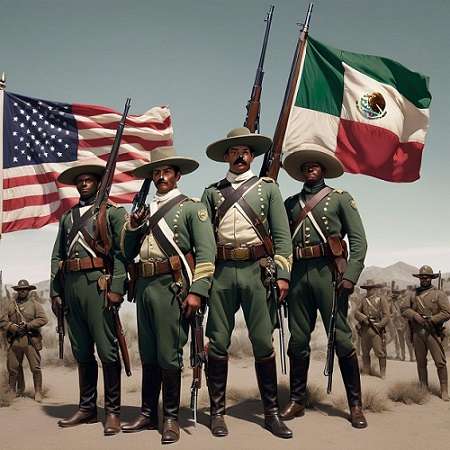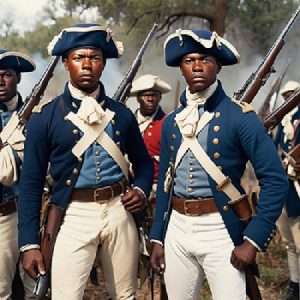Yes, African Americans fought in the Mexican-American War. Both free blacks and slaves served in various capacities, despite facing significant discrimination. Some African Americans served in the U.S. Army, while others worked as laborers, cooks, and servants.
Though the numbers were small, their contributions were notable. Black soldiers often faced harsher conditions and were typically assigned the most dangerous tasks.
Despite these challenges, they played a role in several key battles and their participation highlighted the complex dynamics of race and military service during this period in American history.
Read Also – 20 Interesting Facts About The American Mexican War. – Explained
African Americans in the Mexican-American War
During the Mexican-American War, African Americans served in various capacities. Despite facing significant prejudice and systemic discrimination, they contributed to the war effort.
Some African Americans joined the U.S. Army as soldiers, while others were employed as laborers, scouts, and servants. In the navy, African American sailors played crucial roles aboard ships. Their participation was often overlooked and not formally documented in many cases.
Black Seminoles, a group of African and Native American descent, also played a notable role. They served as scouts for the U.S. Army, utilizing their knowledge of the terrain and survival skills. Their involvement was crucial in navigating the challenging environments of the war.
The war’s aftermath did not bring significant improvements to their social and political status. Despite their contributions, African Americans continued to face severe discrimination and lack of recognition.
African – American participation highlighted their resilience and willingness to fight for a country that had yet to grant them full citizenship and rights. Their service in the Mexican-American War is a testament to their enduring spirit and a crucial, though often neglected, part of American military history.

Enslaved African Americans and the Mexican-American War
Enslaved African Americans played critical yet often unacknowledged roles in the Mexican-American War. They were primarily utilized for labor-intensive tasks that were essential to the war effort.
Building fortifications, transporting supplies, and constructing roads and bridges fell heavily on their shoulders. Their physical labor ensured that troops had the necessary infrastructure to move and communicate effectively.
In addition to manual labor, some enslaved individuals served as personal servants to officers, taking on roles that ranged from cooking and cleaning to tending to horses and equipment. These duties, though less visible, were vital to maintaining the daily operations and morale of the military personnel.
A few enslaved African Americans acted as guides and scouts due to their familiarity with the terrain. Their knowledge was crucial in navigating unfamiliar territories and executing strategic maneuvers. By providing valuable intelligence, they helped prevent ambushes and facilitated successful military campaigns.
Despite their contributions, enslaved African Americans did not receive recognition or freedom in exchange for their service. Their efforts were critical in supporting the logistical needs of the U.S. military, directly impacting the war’s outcome by ensuring that the army remained supplied and operational throughout the conflict.
Read Also: States Involved in the American Civil War – Explained
Louisiana Battalion of Free Men of Color
The Louisiana Battalion of Free Men of Color was a military unit composed of African Americans who were not enslaved.
Free men of color referred to individuals of African descent who were legally free before the abolition of slavery. This battalion included men who owned property, businesses, and had a degree of social standing.
Color achieved recognition for their disciplined service and bravery. They defended their state and contributed to the overall war effort.
Their participation demonstrated the potential and capabilities of African American soldiers.
The battalion fought in several notable battles. They participated in the Battle of Monterrey and the Battle of Buena Vista.
These engagements were critical in the U.S. military’s campaign against Mexican forces.
Their actions in these battles highlighted their courage and tactical proficiency, contributing to the success of American forces in key engagements.
African American Casualties in the Mexican-American War
African American casualties in the Mexican-American War were significant. They fought alongside white soldiers in fierce battles like Buena Vista, Cerro Gordo, and Chapultepec.
Many lost their lives due to combat injuries, diseases prevalent in the harsh Mexican environment, and inadequate medical care.
The war’s arduous conditions and the intense fighting took a heavy toll on Black soldiers, resulting in a substantial loss of life.
African American soldiers lost their lives due to the brutal nature of the warfare, which included artillery bombardments, musket fire, and bayonet charges. The difficult terrain and disease also took a toll on their numbers.
Their participation, often under harsh and perilous conditions, highlighted their courage and the sacrifices they made during the conflict.
Despite the lack of acknowledgment and the severe risks, African Americans played a crucial role in the war, enduring significant losses in the process.

Discrimination Faced by African American Soldiers During The Mexican-American War
African American soldiers in the Mexican-American War faced significant discrimination. They were often assigned the most dangerous and menial tasks.
Despite their willingness to serve, black soldiers were frequently relegated to roles such as laborers, cooks, and servants rather than being allowed to fight on the front lines.
When they did participate in combat, they were usually given the most perilous missions, reflecting the racial prejudices of the time.
The military hierarchy maintained strict segregation. African American soldiers did not receive the same training, equipment, or pay as their white counterparts.
Promotion opportunities were almost nonexistent, and black soldiers were rarely acknowledged for their bravery or contributions.
The racial bias extended beyond the battlefield; African American soldiers lived in separate, often inferior, quarters and were subjected to harsher punishments for infractions.
Despite their service, African Americans were not afforded the same respect or recognition as white soldiers.
Their efforts and sacrifices were largely ignored in historical accounts of the war. This discrimination underscored the broader societal racism prevalent in the United States during the 19th century.
African American soldiers’ experiences in the Mexican-American War highlighted the deep-seated racial inequalities that would persist in the military and society for many years.
Key battles involving African American Soldiers in the Mexican-American War
Key battles involving African American soldiers in the Mexican-American War include Buena Vista, Cerro Gordo, and Chapultepec.
At Buena Vista, they fought alongside Zachary Taylor’s forces, demonstrating courage under fire. In Cerro Gordo, their participation aided General Winfield Scott’s victory.
The Battle of Chapultepec, a pivotal moment in the war, saw African American soldiers engage in intense urban combat. These battles highlight their significant contributions to the American military’s success.
Famous African American figures in The Mexican-American War
Famous African American figures in the Mexican-American War include John Riley, an Irish-born soldier who deserted the U.S. Army and led the Saint Patrick’s Battalion, which included African Americans and fought for Mexico. John Horse, a Seminole and African American leader, played a significant role by guiding the Black Seminoles who served as scouts for the U.S. Army. These scouts provided invaluable knowledge of the terrain and local tactics, aiding the American forces.
Another notable figure is Moses Washington, a black Texan who fought bravely at the Battle of Monterrey. His efforts, although not widely recognized, exemplify the courage and determination of African Americans in the war.
Henry O. Flipper, the first African American graduate of the U.S. Military Academy at West Point, represents a later era, but his legacy is rooted in the contributions of those who fought before him.
Their involvement in the war, despite facing immense discrimination, laid the groundwork for future African American military service.
These individuals’ stories are a testament to the resilience and bravery of African Americans in the face of adversity.
Their contributions, often overlooked, were crucial in shaping the course of the Mexican-American War and the broader history of African American military service.
Also Read: britannica.com/event/Mexican-American-War
African American Veterans of the Mexican-American War: Their Lives After the War
African American veterans of the Mexican-American War faced significant challenges upon returning home. Despite their service, they returned to a society that continued to view them through the lens of racial prejudice.
Many found it difficult to secure employment, often relegated to low-paying, menial jobs. Some veterans, particularly those who had been enslaved before the war, struggled to assert their rights and gain recognition for their contributions.
Economic hardship was a common experience. Veterans rarely received pensions or benefits comparable to their white counterparts.
Discrimination in housing and employment limited their opportunities for advancement. Many lived in poverty, their wartime sacrifices unrecognized and unrewarded.
Socially, African American veterans encountered continued segregation and exclusion from many aspects of public life. Their military service did not translate into greater societal acceptance.
They faced the same systemic racism that characterized American society at the time.
Despite these obstacles, some veterans became community leaders, advocating for civil rights and better treatment of African Americans. They used their experiences to highlight the contributions and capabilities of black citizens.
Also Read: american experience/features/grant-mexican-american-war
Conclusion
African Americans played vital roles in the Mexican-American War. Free Black men like those in the Louisiana Native Guards fought as soldiers.
Enslaved African Americans served as laborers and support personnel. Their contributions to the American victory were undeniable.
However, the war’s outcome did not bring immediate freedom for enslaved African Americans. Their participation marked a significant step in the ongoing struggle for racial equality.